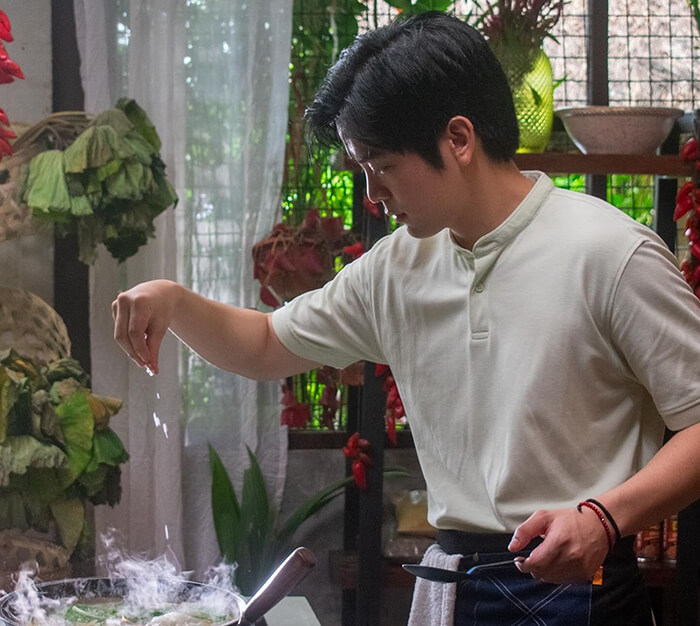Un/Happy for You: When sad is happy
The title of the movie is already an alert, an alarm—a spoiler. Yet it still comes as a surprise that Un/Happy for You is a departure from Star Cinema’s (with Viva Films as co-producer) usual glossy ending. The film outfit that has had the habit of having saccharine storytelling and even syrupy resolution gambles yet again on a happy-sad storytelling. With this new venture, the production outfit delivers an oxymoron of sorts—how to make a sad experience a happy encounter. If not at all happy, it’s enlightening or comforting, to say the least. (The last time Star Cinema made a smashing poignant movie was when it co-produced the tearjerker time travel Rewind that earned almost P1 billion at the box office.)
The screen comeback in Un/Happy for You of former real lovers Joshua Garcia and Julia Barretto is not exactly a hosanna moment—what with the usual plot trajectory of boy meets girl, boy and girl fall in love, then the breakup that they try to salvage. The lead actors, however, remain faithful to their acting chops as if some love sparks are still enjoyed by the once-upon-a-time love team.

Truth is, Joshua, a GOY (the new generation’s term for handsomeness that Grows On You), is a credible actor who displays beauty in pain. Julia pulls her acting strings and matches Joshua’s energy on screen. If only for that, Un/Happy for You is all worth one’s hard-earned bucks for a seat in the cinema.
It is a showbiz fact that not many Tinseltown lovers who headed to Splitsville can pull off an onscreen comeback. But Joshua and Julia prove that when their mettle as actors was put to the test, they could still cast magic on the silver screen. As of this writing, the romantic drama has reportedly hit the global box office with about P400 million earnings since it started showing in theaters on Aug. 14. That is an impressive sum considering that the at-the-moment reel couple are no longer a love team.

Onscreen chemistry between Joshua and Julia as star-crossed lovers Juancho Trinidad and Zy Angeles, respectively, has something to do with the success of the movie. Juancho is a chef specializing in Bicolano cuisine while Zy is an ambitious food writer who returns to Bicol from New York for an in-depth story about Bicolano food. Though some food scenes have the flavor and texture of the 2002 Star Cinema film Kailangan Kita (2002) that starred Julia’s aunt, Claudine Barretto, it is a forgivable stance.
The movie is a one-hour-and-30-minute discussion on moving on and healing. It discusses the intrinsic human nature of falling in love, getting sideswiped by love, holding on to love, hating, and forgiving.
Forgiveness, as Un/Happy for You reveals, is a process. Resentment takes a back seat to a heart that forgives. Forgiveness is not merely a willful act of accepting apologies; it also means, most importantly, that the heart will not be angry anymore. Forgiveness is hard to give because it means the offense is erased. But Un/Happy for You gives a glimpse of a clean slate.

Anger takes up so much of Juancho’s persona. It consumes him to a large extent so that his way of life, even if he’s able to function well, is ruled by it. Ahh, Juancho is scorned to perfection by a love that he lost. The irony that love is the antidote to a broken heart is what Juancho found. His healing is found in love—and what kind!
The film is also about self-preservation. Self-preservation in the film is a radical moral code because it borders on contrasting the popular morality of altruism. Zy left Juancho because she needed to preserve what was left of her. In Russian-American philosopher Ayn Rand’s dictum, Zy’s action falls under ethical egoism. She wrote a book about it: The Virtue of Selfishness.
In the words of Zy when confronted by Juancho why she left him: “Napagod ako sa kabubuhat sa ‘yo. Nung nalulunod ka, ayokong malunod kasama mo. Ang bigat na ako lamang ‘yung lumalaban. Kaya pati ako bumabagsak na. Nauubos na.”
Human suffering is not a variable; its constancy in life, as both Juancho and Zy experience it, is an exploration of a life worth living—even if it hurts. The film proves that two single people can be in love but not necessarily be happy in a relationship. If one wants to cease to be a party to the suffering, one has the right to turn one’s back. It may be radical but the film subscribes to ethical egotism.
Un/Happy for You is for those who are scarred by love and scared to find it again. It heals the wounds and right at the bottom of the scar is a newfound courage to venture anew—whether with another one or the self.
Though the storytelling sometimes borders on being trite, it helps that the solid acting ensemble keeps the movie afloat. Nonie Buencamino proves he is a biz veteran with his absorbing portrayal of the cane-carrying character of Daddy Jun, adoptive father of Juancho and father figure to everyone in the restaurant business of Juancho. Ketchup Eusebio gives life to the meaningful work of restaurant workers. Walang pwedeng itapon sa bawat eksena n’ya. Kaila Estrada as Aiah, best friend and business partner of Juancho, also did her part in helping Juancho flesh out the meaning of his life. John Lapus, as the vibrantly-clad melancholic JP, provides the necessary ice breaker in the film. One scene, however, where Julia and Joshua perform a funny dance before John so he will not break down, seemingly did not look original because it was already done in the sun dance Laida Magtalas and Miggy Montenegro (Sarah Geronimo and John Lloyd Cruz) performed in You Changed my Life (Star Cinema/Viva Films, 2009).
The movie theme song Paubaya hauntingly and beautifully sung by Moira Dela Torre doesn’t seem to encapsulate the merit of the film. Un/Happy for You may not be your usual sappy love story but it is about healing—the preparation for moving on, the acceptance of a love that is there but cannot be celebrated, the acceptance of individuality, the ascent of self-discovery. The song, beautiful and apt as it was when the much-ballyhooed breakup between Joshua and Julia happened, looks like a misplaced choice simply because the song is about giving up one’s love for someone else, with the self as the sacrificial lamb, the defeatist party. The film is about giving up on love for a purpose much higher than the self—not as a sacrifice but a future reward.
In the name of love, how much are we willing to sacrifice? When do we give up? When do we give in? Un/Happy for You has the answer. Sadness is a happy reward in a mask.


